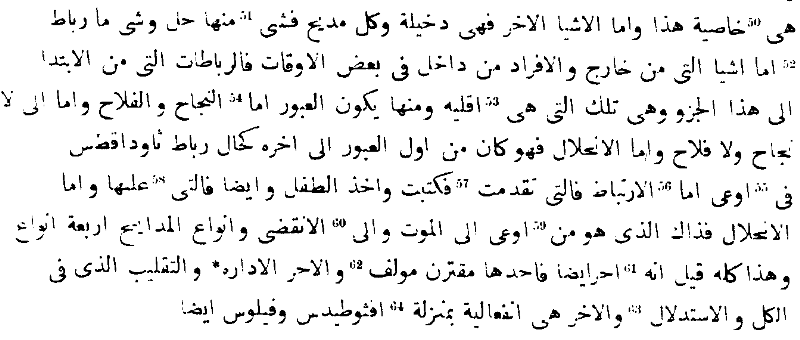Аристотель «Поэтика»: Завязка и развязка (1455b24)
18. Ἔστι δὲ πάσης τραγῳδίας τὸ μὲν δέσις τὸ δὲ λύσις, τὰ [25] μὲν ἔξωθεν καὶ ἔνια τῶν ἔσωθεν πολλάκις ἡ δέσις, τὸ δὲ λοιπὸν ἡ λύσις· λέγω δὲ δέσιν μὲν εἶναι τὴν ἀπ᾽ ἀρχῆς μέχρι τούτου τοῦ μέρους ὃ ἔσχατόν ἐστιν ἐξ οὗ μεταβαίνει εἰς εὐτυχίαν ἢ εἰς ἀτυχίαν, λύσιν δὲ τὴν ἀπὸ τῆς ἀρχῆς τῆς μεταβάσεως μέχρι τέλους· ὥσπερ ἐν τῷ Λυγκεῖ τῷ Θεοδέκτου [30] δέσις μὲν τά τε προπεπραγμένα καὶ ἡ τοῦ παιδίου λῆψις καὶ πάλιν ἡ αὐτῶν <λύσις> δ᾽ ἡ ἀπὸ τῆς αἰτιάσεως τοῦ θανάτου μέχρι τοῦ τέλους.
Перевод М. Гаспарова
<г) Завязка и развязка.>
[b24] Всякая трагедия состоит из завязки (δέσις) и развязки (λύσις). То, что находится вне <драмы>, а часто такжекое-что из того, что внутри, — это завязка; а все остальное — это развязка. [b26] Завязкой я называю то, что <простирается> от начала <трагедии> до той ее части, на рубеже которой начинается переход к счастью <от несчастья или от счастья к несчастью>; развязкой же — всё от начала этого перехода и до конца. [b29] Так, в «Линкее» Феодекта завязка — все предварительные события, захват младенца, затем самих <родителей>, развязка же — от обвинения в убийстве до конца.
[b24] Всякая трагедия состоит из завязки (δέσις) и развязки (λύσις). То, что находится вне <драмы>, а часто также
Перевод В. Аппельрота
В каждой трагедии есть две части: завязка и развязка; первая обыкновенно обнимает события, находящиеся вне [драмы], и некоторые из тех, которые лежат в ней самой, а вторая — остальное. Я называю завязкой ту часть, которая простирается от начала до момента, являющегося пределом, с которого наступает переход к счастью <от несчастья или от счастья к несчастью>, а развязкой ту, которая продолжается от начала этого перехода до конца: так в «Линкее» Феодекта завязка — то, что случилось раньше, захват ребенка и заключение в тюрьму, а развязка — от обвинения в убийстве до конца.
Перевод Н. Новосадского
Во всякой трагедии есть завязка и развязка. События, находящиеся вне драмы, и некоторые из входящих в ее состав часто бывают завязкой, а остальное — развязка. Завязкой я называю то, что находится от начала трагедии до той части, которая является пределом, с которого начинается переход от несчастья к счастью или от счастья к несчастью, а развязкой — то, что находится от начала этого перехода до конца. Например, в «Линкее» Феодекта завязкой служат происшедшие раньше события, похищение ребенка и (раскрытие виновных, а развязка) от обвинения в убийстве до конца.
Translated by W.H. Fyfe
In every tragedy there is a complication and a denouement. The incidents outside the plot and some of those in it usually form the complication, the rest is the denouement. I mean this, that the complication is the part from the beginning up to the point which immediately precedes the occurrence of a change from bad to good fortune or from good fortune to bad; the denouement is from the beginning of the change down to the end. For instance, in the Lynceus of Theodectes the complication is the preceding events, and the seizure of the boy, and then their own seizure; and the denouement is from the capital charge to the end.
Translated by S.H. Butcher
Every tragedy falls into two parts — Complication and Unraveling or Denouement. Incidents extraneous to the action are frequently combined with a portion of the action proper, to form the Complication; the rest is the Unraveling. By the Complication I mean all that extends from the beginning of the action to the part which marks the turning-point to good or bad fortune. The Unraveling is that which extends from the beginning of the change to the end. Thus, in the Lynceus of Theodectes, the Complication consists of the incidents presupposed in the drama, the seizure of the child, and then again … [the Unraveling] extends from the accusation of murder to the end.
Translated by I. Bywater
(4) There is a further point to be borne in mind. Every tragedy is in part Complication and in part Denouement; the incidents before the opening scene, and often certain also of those within the play, forming the Complication; and the rest the Denouement. By Complication I mean all from the beginning of the story to the point just before the change in the hero’s fortunes; by Denouement, all from the beginning of the change to the end. In the Lynceus of Theodectes, for instance, the Complication includes, together with the presupposed incidents, the seizure of the child and that in turn of the parents; and the Denouement all from the indictment for the murder to the end.
Traduction Ch. Emile Ruelle
I. II y a, dans toute tragédie, le noeud et le dénouement. Les faits pris en dehors de la fable, et souvent aussi quelques-uns de ceux qui s’y accomplissent, voilà le noeud; tout le reste constitue le dénouement.
II. J’appelle noeud ce qui a lieu depuis le commencement jusqu’à la fin de la partie de laquelle il résulte que l’on passe du malheur au bonheur, ou du bonheur au malheur; et dénouement, ce qui part du commencement de ce passage jusqu’à la fin de la pièce. Ainsi, dans le Lyncée de Théodecte, le noeud consiste dans les faits accomplis jusques et y compris l’enlèvement de l’enfant, et le dénouement va depuis l’accusation de mort jusqu’à la fin.
